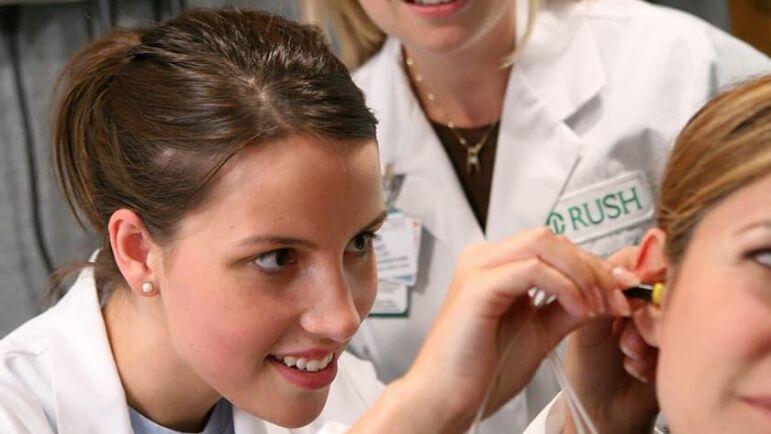Listen up. Audiology is a hot profession that’s worth your attention if you’re considering a field in health care.
Due partly to the growing population of older adults in the U.S., the Bureau of Labor projects a 21 percent increase in audiology jobs from 2016-2026, making it one of the fastest-growing careers in the U.S. And a recent CareerCast survey ranked audiology as the fourth-least stressful job in the country.
Have your ears perked up? Learn all about audiologists and the training required to become one. It might just be your dream career.
What is an audiologist?
Audiologists are doctorally trained experts in the prevention, evaluation, diagnosis and management of hearing and balance disorders. They serve patients across the lifespan, from newborns to older adults.
What does an audiologist do?
Audiologists administer and interpret tests that evaluate hearing, balance and tinnitus problems, and provide rehabilitation services that includes hearing aids, cochlear implants and use other devices to help people cope with hearing issues. They also provide patient education, counseling, auditory and visual communication training, tinnitus management and communication strategy training. Audiologists are involved in hearing loss prevention and identify newborns, school-aged children, adults and older adults who have hearing loss.
Where do audiologists work?
The general public — and even some audiology students — often don’t realize just how many different fields employee audiologists.
“They think audiologists only work in a doctor's office or a hospital,” says Patricia McCarthy, PhD, director of Rush University’s Doctor of Audiology program, which is ranked ninth in the nation by U.S. News & World Report. “In fact, there’s a broad spectrum of types of employment. Students who are interested in audiology are often excited to find out they can find employment in a sector that marries some of their other interests.”
Yes, many audiologists are employed at large medical centers or by a physician in private practice, but they may also find them in a private practice of their own. The possibilities, though, don’t end in clinical settings.
Manufacturing Organizations (or Industry)
Audiologists may consult or work for companies that manufacture products in loud environments. Occupational Safety and Health Administration, or OSHA, standards limit the decibel levels and the amount of time factory workers can work safely in loud environments. They develop hearing conservation plans, monitor compliance with OSHA standards, provide regular hearing screenings, provide employee education programs focused on hearing protection, and recommend architectural and design modifications for limiting noise exposure for workers.
Public School Systems
Public school systems hire audiologists to provide hearing screenings to students and follow up with teachers and parents when hearing issues are uncovered. Educational audiologists develop recommendations for further testing and rehabilitation, and work with teachers to manage classrooms with students who have hearing disorders. Audiologists also help develop individualized educational service plans, which are needed to provide special education services to students.
Military & U.S. Department of Veterans Affairs
Meanwhile, the military and the U.S. Department of Veterans Affairs, or VA, are two of the largest employers of audiologists. In fact, audiology didn't exist as a profession until World War II, when veterans with hearing loss returned home in need of hearing services. While the VA attends to veterans, audiologists in the military provide consultation on equipment meant to prevent hearing loss for soldiers in the field, and assess and treat active-duty members and dependents.
The following are some other sectors audiologists may find themselves in:
- Community non-profit agencies
- Forensic audiology
- Graduate-level teaching
- Hearing aid industry
- Research
And your prospects for finding a job are good. For instance, students in Rush University’s audiology program consistently have a 100 percent employment rate within 12 months of graduation.
How much do audiologists make?
As of February 28, 2019, the average audiologist salary in the U.S. was $81,294, according to salary.com. Audiologists in the highest 10 percent of the pay scale earn well over $100,000.
Characteristics of a good audiologist
Students go through a four-year doctoral program to become an audiologist, so they need to be well-prepared academically. But academic prowess has to be coupled with compassion, strong communication skills and a high degree of professionalism due to the sensitivity of patient care.
Do you need to go to medical school to become an audiologist?
No. You would need a medical degree to become an otolaryngologist, which is commonly known as an ear nose and throat, or ENT, physician. An ENT physician provides medical services. Audiologists specialize in hearing, balance and tinnitus assessment and management.
How do I become an audiologist?
Audiologists need to earn a doctorate in audiology, or AuD, and most states require a license to practice after completing the doctorate. The license ensures an audiologist has the appropriate educational background and has completed the requisite clinical practicum hours. There may also be a criminal background check to earn licensure. All states have different requirements.
In addition, audiologists have to complete continuing education credits every year to stay current. Again, each state has its own requirements.
How to prepare for application to an AuD program
Schools have different admissions criteria, but you should focus on keeping your GPA on the higher end, preferably 3.0 or higher, and aim for GRE verbal and quantitative scores in the 50th percentile or higher. You don’t necessarily need an undergraduate degree in communications sciences, speech-language pathology or a similar concentration, but you will need a good foundation of coursework in statistics/math, biological, physical and social sciences.
“We've had successful students with undergraduate backgrounds in everything from linguistics and microbiology to marketing,” McCarthy says. “You just need the appropriate prerequisite coursework.”

